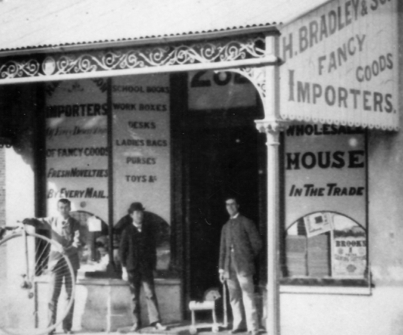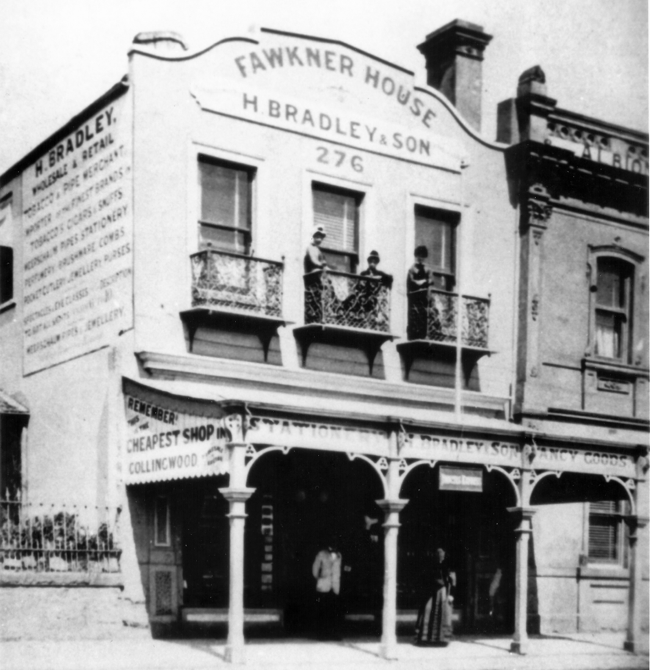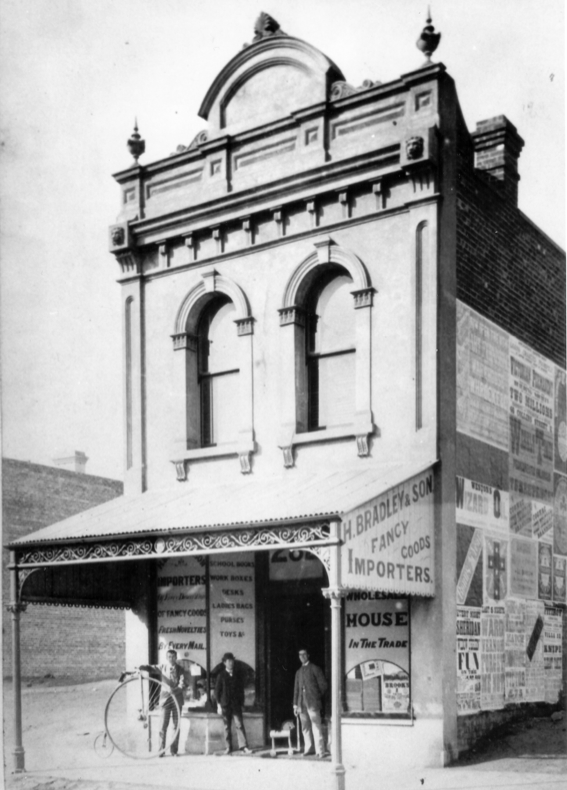Collingwood Notables Database
Henry Bradley
1831-1911
Tobacconist, fancy goods dealer, clay pipe manufacturer
Henry Bradley was the proud proprietor of a business in Smith Street Collingwood where he was a tobacconist and fancy goods dealer. According to Bradley’s biography in Victoria and its metropolis, his first shop was in the former residence of John Pascoe Fawkner, a founder of Melbourne, and a photo shows the name Fawkner House proudly emblazoned on the façade.
Bradley had arrived in Melbourne in 1866. He worked variously as a shop assistant, tobacconist, and hairdresser in Melbourne and Kyneton before returning to Melbourne in 1877 for a stint as a publican. He then set up his own business as a tobacconist and dealer in fancy goods in Smith Street, taking over the business of Mr Joseph Wigg early in 1879. He rented this shop from Patrick Coyle, owner of the neighbouring Albion Hotel, who had bought, from Fawkner’s widow, all the property in the block between Perry and Johnston Street. A large advertisement in The Mercury and Weekly Courier of 15 February 1879 proclaims Bradley’s intention to have the best and cheapest shop in Collingwood for tobacco, cigars, pipes, perfumery, stationery, hair brushes, combs, purses, spectacles, eyeglasses, cutlery, toys and fancy goods – wholesale and retail. He would also repair jewellery and meerschaum pipes.
The elder of his surviving sons, Henry Algernon, joined his father in the business, and the name was changed to H. Bradley & Son. Henry Algernon had previously worked at Thomas’s Great Drapery Hall in Emerald Hill in the Fancy Department and received a testimonial ‘… honest, sober, attentive to his work .. . he is a good salesman … with a little more experience would make a very valuable hand.’ As well as importing many products, the Bradleys also had a factory in South Melbourne which manufactured wooden toys, and were agents for the game of table football. Henry Algernon also went into business on his own account in July 1879 in partnership with Alfred Tenbosch (aka Alfred Dubois) as cocoa manufacturers under the name of Dubois and Co.
Coyle was subdividing the rest of his land into building blocks and Bradley bought one four doors north of his existing shop. By 1884 he had built his own double-storey shop on the site, and in the late 1880s he added a factory, number 3 Bedford Street, to his property. This two-storey small gable-ended brick factory stood almost directly behind his shop, conveniently accessible by a right-of-way, and was used for the manufacture of clay smoking pipes. Henry Algernon also rented one of Patrick Coyle’s newly-built shops next to his father’s shop for several years.
In both shops the Bradley family lived upstairs, in the typical nineteenth-century model, and became involved in Collingwood life. Henry Algernon joined two lodges, the Loyal Orange Institution (Loyal Campbell No 130 Lodge) and the Masonic Combermere Lodge no 752; it is possible that Bradley senior also belonged to the Combermere Lodge. In 1886 only daughter Fanny married Alfred Joy, son of a well-known Abbotsford family who attended St Philip’s Anglican Church in Hoddle Street, while Henry Algernon married Jessie Powell in 1887. In the meantime Bradley’s first wife had died, and he re-married in 1888.
Like many businesses, Bradley and Son suffered in the 1890s depression. Although the business would continue at a city location, in November 1893 Victorian newspapers advertised the disposal of the whole of the Smith Street wholesale stock, including jewellery, haberdashery, stationery, school requisites, brushware, cutlery, basketware, games, fancy glassware, and books.
Luckily Henry’s pride in his business had extended to having photos taken of his shops, as they have both been demolished. Unfortunately we do not know for sure who are the people shown in the photos. The photo of Fawkner House, which would have been taken in the early 1880s, possibly shows Bradley and his wife Sarah on the footpath, and includes Fanny on a balcony. The photo of the second shop, taken around 1884-85, where a penny farthing bicycle and a wooden horse on wheels are displayed, could show Bradley and his two sons. The only surviving remnant of Bradley’s Collingwood business is the factory in Bedford Street, and the building which they rented at number 322.
Second shop 1884 or 1885
Life Summary
| Birth Date | Birth Place |
|---|---|
| 14 February 1831 | Newark, Nottinghamshire |
| Spouse Name | Date of Marriage | Children |
|---|---|---|
| Sarah Ann Roberts Woulds, 1829- 26 September 1886 | 25 July 1854, Derby | Walter 1855-1855; Henry Algernon Bradley 1858-1950; Fanny 1862-1941; Ernest James 1868-1948. |
| Louisa Simpson | 1888 | |
| Louisa Annie Britten | 1901 |
| Home Street | Home City | Status of Building |
|---|---|---|
| 316 Smith Street | Collingwood | Demolished |
| 282, later 324 Smith Street | Collingwood | Demolished |
| Work Street | Work City | Status of Building |
|---|---|---|
| 322 Smith Street | Collingwood | Extant |
| 3 Bedford Street | Collingwood | Extant |
| Church | Lodge |
|---|---|
| Anglican |
| Death Date | Death Place | Cemetery |
|---|---|---|
| 9 July 1911 | Warburton | MGC |
The Age; The Argus; Geelong Advertiser; The Australasian; Mercury; Weekly Times; Victoria and its metropolis; Bradley Papers, 1870-1925 (SLV MS 13511)
Shop photos courtesy SLV



